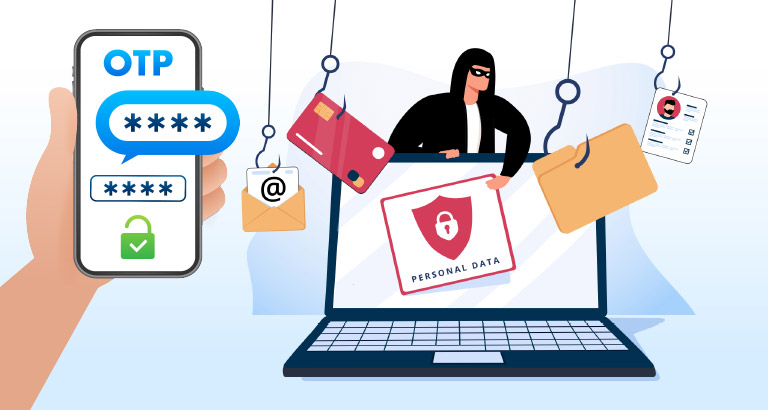
As our lives become increasingly interconnected through digital technologies, the threat of cyber scams loom large.
Cybercriminals are constantly devising new ways to trick unsuspecting individuals into divulging sensitive information or parting with their hard-earned money. In this article, we will highlight some of the trending cyber scams and provide valuable tips on how to avoid falling victim to them, including a focus on OTP scams, trading scams and crypto scams.
 One-Time Password (OTP) Scams:
One-Time Password (OTP) Scams:
OTPs are used as an additional layer of security to authenticate online transactions, but cybercriminals have exploited this system’s vulnerabilities. In these scams, attackers trick victims into providing them with the OTP through various methods, such as phishing emails, fake websites or social engineering techniques.
How to avoid it:
Be cautious with any communication or request that asks for your OTP. Legitimate organisations or financial institutions will never ask you to provide your OTP through email, phone or other unsecured channels. Do not share your OTP with anyone and report any suspicious requests or activities to your IT security team in your company or to the relevant authorities immediately.
Trading Scams:
Trading scams have become a prevalent form of cyber fraud, targeting individuals interested in trading stocks, cryptocurrencies or other investments. These scams involve promises of high returns, fake investment opportunities or phony trading platforms. Cybercriminals use social media, emails or online ads to lure victims into their schemes and extract money or personal information from them.
How to avoid it:
Do thorough research before investing in any trading platform or opportunity. Verify the legitimacy of the trading platform or investment opportunity through independent sources, such as regulatory bodies or trusted financial institutions. Be cautious of unsolicited investment offers, avoid sharing sensitive financial information with unknown or unverified sources, and be skeptical of high-pressure sales tactics or promises of guaranteed returns.
Crypto Scams:
With the rise of cryptocurrencies, cybercriminals have also devised various scams targeting individuals interested in investing in or trading cryptocurrencies. These scams may involve fake initial coin offerings (ICOs), fake cryptocurrency exchanges, or Ponzi schemes that promise high returns on crypto investments.
How to avoid it:
Do thorough research before investing in any cryptocurrency or participating in ICOs. Verify the legitimacy of the cryptocurrency exchange or investment opportunity through independent sources, such as regulatory bodies or trusted financial institutions. Be cautious of unsolicited cryptocurrency offers, avoid sharing sensitive financial information with unknown or unverified sources, and be wary of promises of guaranteed returns or get-rich-quick schemes.
Phishing Scams:
Phishing continues to be a prevalent threat in the cyber landscape. Phishing involves tricking individuals into revealing sensitive information, such as usernames, passwords and financial details, by posing as a trustworthy entity through email, text messages, or phone calls.
How to avoid it:
Be cautious with any unsolicited emails, text messages or phone calls that ask for personal or financial information. Avoid clicking on links or downloading attachments from suspicious emails or text messages. Always verify the authenticity of the sender before sharing any sensitive information. Double-check the URL of websites and ensure they are legitimate before providing any information.
Tech Support Scams:
Tech support scams are on the rise, with cybercriminals posing as technical support representatives from reputable companies and tricking individuals into providing them with access to their devices or sensitive information.
How to avoid it:
Be wary of unsolicited calls, emails or pop-up messages claiming to be from tech support representatives. Do not provide remote access to your devices or share any personal or financial information unless you have started contact with a known and trusted tech support provider. Verify the legitimacy of the caller or email.
Yaqoob Alrayes is a data protection guardian for a national bank in Bahrain and has a Master’s qualification in Cyber Security.



